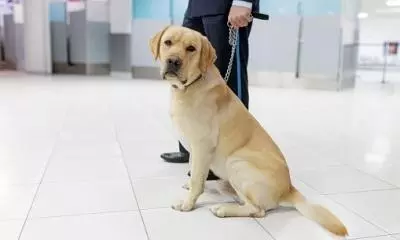
Sniffer dogs can detect COVID faster than a PCR test : Study
text_fieldsLondon: Sniffer dogs can detect COVID infected persons with pinpoint precision, finds a study published on Monday. The study found that people who are infected with coronavirus give off a distinct odour, which these highly trained dogs can sniff out in seconds..
The study, involving scientists from the London School of Hygiene and Tropical Medicine and Durham University, believe the dog screening, followed by swab testing, will pick up 91 per cent of infections, the BBC reported on Monday.
While even the quickest Covid tests take 15 minutes to show a result, the dogs picked up roughly 88 per cent of positive cases with in seconds -- meaning, for every 100 cases, the dogs failed to recognise just 12 infected people. But out of 100 people who did not have Covid, the dogs wrongly suggested -- via the sniff test -- that 14 of them were infected.
This means that two dogs can together screen 300 people in half an hour, researchers said.
This could make the sniff test "a suitable method for mass screening", Prof Logan at the London School of Hygiene & Tropical Medicine, was quoted as saying. Mass screening can be done at airports or at busy train stations to help prevent a super-spreading event.
A canine screening trial to see whether specialist medical sniffer dogs can detect coronavirus in humans began last year, by the charity Medical Detection Dogs, where six dogs were trained to recognise the smell produced by people with Covid-19, but undetectable to the human nose. They were given worn socks, face masks and t-shirts of various materials.
Some of the people in the negative group had common cold viruses, to make sure the dogs were able to distinguish Covid from other respiratory infections. The dogs were able to sniff out the disease even when it was caused by different variants, and when the person had no symptoms or only had very low levels of the virus in their system, the report said.
The results were "further evidence that dogs are one of the most reliable biosensors for detecting the odour of human disease", Claire Guest, Chief Scientific Officer at charity Medical Detection Dogs, was quoted as saying.
According to reports, It takes eight to 10 weeks to train a Covid-19 detection dog. They are rewarded with an edible treat or ball for correctly indicating a positive sample or correctly ignoring a negative one. For the Covid study, the dogs were trained using T-shirts, socks and masks donated by members of the public and NHS staff, some of whom had tested positive for Covid.
Each dog has a different tell: some utter a whining sound while others stand stock-still.
Accurate as they are, dogs will never replace PCR tests. While they might be useful at airports, where they could rapidly screen disembarking passengers, those identified would require a confirmatory PCR test, and to quarantine while awaiting the results – but this would inconvenience far fewer people than requiring everyone to quarantine and undergo PCR tests.
The biggest challenge is scaling up: training takes time, and requires clothing worn by infected and uninfected individuals. According to a Guardian report, Work is under way to identify which odour molecules the dogs are detecting; this could enable a "pseudo-odour" to be manufactured, increasing the number of dogs that could be trained.























